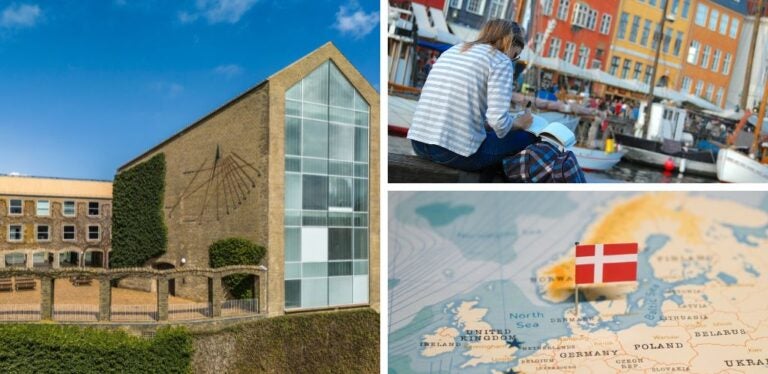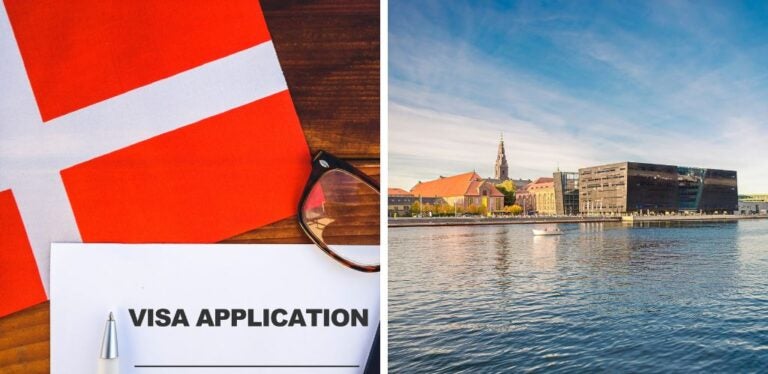Study in Denmark for international students: Tips & tricks
Learn information on how to study in Denmark for international students. Find about it's educational system and admission requirements.
Denmark is rapidly becoming one of the top choices for students looking to study abroad. While its universities may not be as internationally renowned as those in other countries, this Nordic nation has gained popularity for its excellent education, commitment to sustainability, and diverse, multicultural atmosphere. Find out more on how to study in Denmark for international students.
In this post, we aim to help you understand the Danish education system and the requirements for applying to a university or course. We’ll also guide you through the moving process! Join us to find out what makes Denmark such a popular destination for students from all over the world.
How does the education system work in Denmark?
Let’s start by talking about what you can expect if you move to Denmark for your studies. The Danish education system is known for its focus on quality, equality, and the overall development of students. It’s structured in different levels, much like in most countries, and provides a strong foundation from primary education all the way to higher studies. You’ll find options to study in both Danish and English.
In Denmark, education is mandatory for ten years, covering both primary and lower secondary school (Folkeskole). Afterward, students can choose to continue with upper secondary education, which includes both general programs (such as STX, HHX, or HTX) and vocational options. The vocational path is a great choice if you’re aiming to gain specific skills for the Danish job market. When it comes to higher education, Danish universities offer bachelor’s degrees (three years), master’s degrees (two years), and doctoral programs (three years). Many institutions emphasize hands-on, collaborative learning, integrating research, group projects, and strong connections with the professional world.
| Educational level | Duration | Description | Languages of study |
| Basic education (Folkeskole) | 10 years | Compulsory education that includes primary and basic secondary education. | Danish |
| Upper secondary education | 2-3 years | Includes general (STX, HHX, HTX) and vocational programs. These programs prepare students for the labor market. | Danish and English in some programs |
| University degree | 3 years | First level of higher education. Focuses on general studies and professional preparation. | Danish and English (wide offer) |
| University master’s degree | 2 years | Academic and professional specialization with a practical and collaborative approach. | Danish and English |
| Doctorate | 3 years | Advanced research in diverse areas. Includes collaboration with academic institutions and companies. | Danish and English |
Denmark is an attractive destination for international students, offering a broad selection of programs in English. With over 600 courses available in English, the country provides great flexibility. This, along with its strong focus on sustainability and innovation, makes studying in Denmark a highly enriching experience, both academically and culturally.
Requirements to study in Denmark as an international student
Studying in Denmark as an international student can open up many opportunities, but there are certain requirements you’ll need to meet in order to study there. Having your documents in order to prove your eligibility and understanding what’s needed will help you prepare a stronger application and increase your chances of getting accepted into your desired institution. Here’s what you’ll need:
- Letter of admission: You must be accepted into a recognized university, college, or educational institution in Denmark. This means you’ll need to submit your application within the specified deadlines.
- Student visa: If you’re a citizen of a country outside the EU or the European Economic Area, you’ll need to apply for a student visa or residence permit. This process can take up to 60 days.
- Language test: Depending on the program you choose, you may need to prove your proficiency in English (through exams like IELTS or TOEFL) or, in some cases, Danish.
- Academic documentation: Include your previous school transcripts translated into English or Danish. These may need to be certified.
- Financial proof: You’ll need to show that you have enough financial means to cover your living and study expenses. This can be done by providing recent bank statements or sponsorship letters.
- Medical insurance: While Denmark has a public healthcare system, you’ll need private health insurance to cover you during the first few months of your stay until you’re eligible for the local healthcare services.
- Payment of application fees: Many universities require you to pay a fee when you submit your application. This cost varies by institution.
Keep in mind that each university or program may have additional requirements, so it’s important to check the specific admission conditions of the institution you want to apply to. Making sure everything is in order well in advance will help you start your exciting academic journey in Denmark on the right foot.

Steps to study in Denmark for international students
Now that you’re familiar with how the education system in Denmark works and what’s needed to study there, it’s time to get started. While the process may seem challenging, having a clear plan—starting from choosing a school to organizing your move—will help you stay on track. Let’s go over the steps to turn your dream into reality.
1. Evaluate universities and programs in Denmark
The first step is to explore which universities or educational institutions best match your goals. Denmark has some renowned universities, such as the University of Copenhagen and the Technical University of Denmark. Many of them offer bachelor’s, doctoral, and a variety of other programs in English.
You might also consider short courses at technical schools or specialized programs in fields like design, sustainability, and technology, which are strengths of Denmark. Be sure to check international rankings, explore official websites, and, if you can, attend education fairs to get a better sense of the options available.
| University studies | Short courses | |
| Duration | Long programs (3-5 years), ideal for those seeking in-depth academic training. | Short programs (months or weeks), designed to acquire specific skills quickly. |
| Cost | High annual tuition (except for EU/EEA citizens). Some universities offer scholarships or waivers. | More affordable costs, but fewer scholarship options and no exemptions for international students. |
| Languages available | Most programs in English for master’s and doctoral degrees. Some degrees are in Danish only. | High offer in English, especially in practical areas such as design, technology and sustainability. |
| Main objective | Focused on long-term academic and professional development, with a focus on research and theory. | Focused on practical skills and specialization in a specific area. Ideal to complement studies. |
| Entry requirements | Complex: previous degrees, advanced level of English (TOEFL, IELTS) and extensive documentation. | Simple: previous experience or basic level of English is usually sufficient, depending on the course. |
| Flexibility | Structured calendars and face-to-face or hybrid classes. Less flexibility for those who work. | More flexible schedules and formats (face-to-face, online or intensive). |
| Career opportunities | Access to strategic or leadership positions, especially in global companies or research. | Perfect complement to improve specific skills and make your CV more competitive in the short term. |
2. Review financing options
Once you’ve chosen your program, the next step is figuring out how to fund it. Denmark offers several scholarships, making it more affordable than other Nordic countries. Erasmus+ and scholarships from the Danish government for international students are excellent options. You can also explore agreements between universities and financial institutions that provide student loans with favorable conditions.
Make sure to research the requirements and deadlines for these options carefully. Good financial planning is essential to ensure a smooth experience.
3. Apply to a study program
If you’ve already decided what to study and how to finance it, it’s time to start preparing your application. Before you begin, double-check that you meet all the specific requirements for your program and have all the necessary documents ready. You’ll probably need recommendation letters, personal statements, transcripts, and language test results like TOEFL or IELTS if the program is in English. The website of the institution you choose will have all the details about what to submit for each program.
Don’t forget to check the deadlines for each university or institution! They often close applications months before the course begins. It’s also a good idea to keep an eye on platforms like Optagelse.dk, which manage applications for Danish schools.
4. Apply for a student visa
Once you’re accepted into your program, you’ll need to apply for a student visa for Denmark. Since this process can take a while, it’s a good idea to begin the paperwork early. For courses lasting more than three months, you’ll need a temporary residence permit, which requires documents like your admission letter, proof of financial means, and health insurance.
Check the website of the Danish embassy in your country for a complete list of requirements and details about the application process. In the meantime, you can get a general idea of the types of visas available and how the application process works in Denmark’s digital nomad visa.

5. Preparing your move to Denmark
We’ve reached the most exciting part! Now it’s time to plan your arrival. Look into the cost of living in cities like Copenhagen or Aarhus, search for housing, and learn about the rental requirements in Denmark. Platforms like BoligPortal and DBA.dk are great resources for finding a place to stay.
Don’t forget to take care of other important details like arranging transportation, registering as a resident (CPR), opening a local bank account, or getting a fee-free card like Revolut.
6. Connectivity in Denmark
Before finalizing your move to study in Denmark, it’s important to think about how you’ll stay connected. Having reliable internet access will help you settle in more quickly. It’ll allow you to handle paperwork, send confirmation emails to your university, find your new home on a map, or get in touch with the person who will welcome you upon arrival.
To make this easier, we suggest looking into Holafly Connect’s global internet plans. They’re ideal for staying connected right from the start, offering fast and reliable internet as soon as you arrive in Denmark. These plans include perks like connecting multiple devices at once (with unlimited data or 25 GB plans) and coverage in over 170 destinations worldwide. That way, you won’t have to worry about extra charges if you decide to explore some of the amazing spots around Denmark during your stay.
Holafly Connect plan options
Depending on your connectivity needs, you can choose from several options. If your needs change later, don’t worry—you can cancel or switch your plan at any time. Here are the available options:
- 10 GB plan: Ideal for those who need a basic connection for browsing, using maps or checking emails. Its monthly cost is 39,90 euros ($40,93).
- 25 GB plan: Perfect for students who need to make video calls, download documents or work online. Its rate is 49,90 euros ($51,19) per month.
- Unlimited plan: Designed for demanding users who require constant connection on multiple devices. This plan is priced at 64,90 euros ($67,90) per month.
Important: If you are a frequent traveler and want to stay connected without worrying about expensive roaming or looking for a new SIM at every destination, Holafly’s subscription plans are for you. With a single eSIM, enjoy internet in more than 170 countries for a fixed price and no surprises on your bill. Travel without limits and connect easily and securely! 🚀🌍

When and how to homologate degrees and courses in Denmark?
Chances are, you’ll need to have your academic qualifications or course recognized in order to continue your studies in Denmark. This process is essential to validate your credentials and ensure they meet the standards of the Danish education system, especially for undergraduate and graduate programs. While it’s not always required for short courses, having an official equivalency can open up more academic and professional opportunities for you.
The organization responsible for recognition in Denmark is Aarhus University (AU) – Danish Agency for Higher Education and Science. They evaluate foreign qualifications and check how they compare to the local education system. To start the process, you’ll need to provide:
- Certified copies of your academic qualifications.
- Transcripts translated into English or Danish.
- Description of the study programs you have completed.
- Valid passport or identification document.
The cost of the process can vary, but it’s typically free if you go through the official agency. However, you might need to pay for things like certified translations, specialized consultations, or other extra services. These could range from 200 to 500 euros ($204 to $512).
The time it takes to complete the recognition process depends on the complexity of your case and the level of studies. In general, it can take anywhere from six weeks to three months.

How much does it cost to study in Denmark as an international student?
Nordic countries are known for being expensive, so you’re probably wondering if you can afford it even with a scholarship. It’s true that while education is free for EU citizens, the costs can be high for students from outside the EU. Additionally, the cost of living in Denmark is higher compared to other European destinations. Let’s take a look at an estimate of the prices you can expect:
Academic costs in Denmark
- University tuition: Non-European students pay between 6,000 and 16,000 euros per year ($6,140 to $16,380), depending on the institution and the program chosen.
- Short courses: Usually cost between 500 and 2,000 euros ($512 to $2,045) per course.
Living expenses
| Concept | Cost in dollars |
| Housing | 410-820 monthly rent |
| Transportation | 51 public transportation card |
| Food | 204-307 |
| Other expenses (leisure activities and study materials, etc.) | 102-204 |
| Total monthly | 767-1,382 |
Keep in mind that this table shows approximate costs, which can vary depending on the city you’ll be living in and your lifestyle. While studying in Denmark does require a significant investment, the quality of education and the job opportunities afterward make it a very appealing option.
Study online in Denmark for international students
If you’re interested in studying at Denmark’s prestigious institutions but don’t want to move, you’re in luck. Denmark is a pioneer in online education, offering programs in areas like business, technology, and social sciences. This way, you can enjoy the country’s high academic standards from anywhere in the world, benefit from flexible schedules, and skip the cost of relocating. Sounds pretty great, right?
Keep in mind that online learning also comes with its challenges. You’ll need strong self-discipline, as there’s less face-to-face interaction with classmates and professors. Plus, a reliable internet connection is essential to access classes and resources.
What are the options for studying online in Denmark?
Denmark has well-regarded universities that offer online programs for international students. Some of the most popular options include:
- Aarhus University: Known for its academic excellence, it offers online courses in areas such as management, technology and communication.
- Copenhagen Business School: Business and management programs aimed at professionals seeking to broaden their skills.
- Roskilde University: Specialized in interdisciplinary programs, perfect for those seeking a broader perspective.
Additionally, international platforms like Coursera and edX partner with Danish universities to offer short courses and certification programs as a way to complement your studies.
To find out the exact requirements, it’s best to check the website of the university you’re interested in. However, in most cases, the process is similar to applying for an on-campus program—except for the student visa. You’ll typically need translated academic transcripts (in English or Danish), language test scores like IELTS or TOEFL, and a motivation letter outlining your academic goals. Some programs may also require letters of recommendation from professors or employers.
Frequently asked questions about how to study in Denmark for international students
Not always! Many universities in Denmark have English-taught programs, especially at the master’s and PhD levels. However, if you’re planning to study in Danish, you’ll need to prove your proficiency through exams like the Prøve i Dansk 3.
Bachelor’s degrees in Denmark typically take three years to complete, while master’s programs usually last two years. PhDs can range from three to five years, depending on the field of study.
Students from the EU, EEA, or Switzerland can study for free at Danish universities. However, if you’re from outside these regions, tuition fees generally fall between 6,000 euros and 16,000 euros per year ($6,140–16,380). Don’t forget to factor in your living costs as well.
Non-EU/EEA students will need a student visa to study in Denmark. This process requires proof of admission to a Danish university, financial stability, and valid health insurance. Since it can take several weeks, it’s best to start the application early.
Yes. International students with a study visa can work up to 20 hours per week during the academic year and full-time during holidays. It’s a great way to help cover your expenses while studying.
You can choose from student dorms, apartment rentals, or shared rooms. Platforms like Student Housing Denmark or Lejebolig are great for finding suitable options. Rent typically ranges from 400 euros to 800 euros per month ($410–820), depending on the location.





 Language
Language 


















 No results found
No results found



